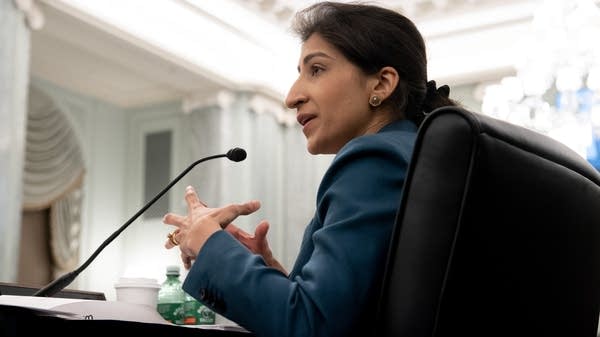As Lina Khan’s legal career started, she argued that antitrust laws weren’t only about keeping prices low. President Biden just made her a top antitrust regulator.

This week, the White House appointed Lina Khan to chair of the Federal Trade Commission. The announcement came just hours after she was confirmed by the Senate to be a commissioner. At just 32, she’s the youngest-ever FTC chair.
Khan rose to fame for a paper she wrote while at Yale Law School, making the case for reining in Amazon’s monopoly power. She went on to work on Capitol Hill, as an FTC staffer and as a professor at Columbia University’s law school.
Cecilia Kang, the co-author of the upcoming book “An Ugly Truth: Inside Facebook’s Battle for Domination” who covers tech policy for The New York Times, says the difference between commissioner and chair is significant. The following is an edited transcript of our conversation.
Cecilia Kang: The chair has a lot of power, in that the chair sets the agenda, and the chair has more direct oversight, if you will, of all the bureaus that handle all of the operations of the agencies. So this appointment, this seat, is really not just symbolic. It really is, in practice, a very important seat.
Amy Scott: For those who don’t follow the FTC very closely, what tools does the agency have that other antitrust players do not?

Kang: I’ll tell you what they don’t have. They don’t have regulatory power. They really don’t create policy that much, and what I mean by that is they’re not like the Federal Communications Commission that creates regulations over the companies that they oversee. The FTC is purely a law enforcement agency. When they see problems, that’s when they step in, and they police. They are cops, essentially, of the law.
Scott: They also approve or reject mergers and can force companies to change the terms. How might Lina Khan, or the commission under Lina Khan’s leadership, use those tools, do you think?
Kang: I think you can expect mergers to be a lot harder under Lina Khan. I think she’s very skeptical of consolidation, not just in the tech industry, but across the economy. That said, it’s really expensive, and it’s hard to bring cases. Tech companies have endless resources. The FTC certainly does not.
Scott: The FTC is 106 years old, and many have said not only that it needs more resources, but needs to get, you know, smarter and hipper. How much do you think Khan’s appointment moves it in that direction?
Kang: There are a couple of things going on within the FTC. I think there’s a tradition to go after certain kinds of cases, like fraudsters, that kind of scam. I think that Lina Khan views this as a moment. She would come in and, perhaps, try to change the habits and the priorities to focus a little bit more on these bigger issues in cases. I think it’s gonna be hard. It’ll be hard for Lina Khan as much as she has that kind of ambition, and I think also, there’s so much expectation that she comes with. There’s sort of a lot that she’ll have to overcome in the first 100 days or so, I imagine.
Scott: More broadly, what do you think her appointment says about the Biden administration’s overall approach to antitrust and the tech industry?
Kang: I was surprised that she was named chair. I was surprised that President Biden appointed Tim Wu, who is also a real critic of Big Tech. He has advocated for breaking up tech companies, in particular, Facebook. President Biden put him in the White House on the National Economic Council, in a newly created position that’s focused on competition. It shows that the Biden administration is focused on competition, and that — really — the ideas of breaking up tech monopolies and going after tech companies, which used to be sort of a fringe idea just a few years ago, has moved very much into the mainstream. So, it shows that this is a priority, and the National Economic Council has many people who are sort of younger, they come from progressive left politics, and they also don’t have sacred cows, if you will. They don’t have this sort of, “You can’t talk about breakup, you can’t talk about regulating X, Y and Z” in the way that I’d heard from so many government officials for so many years in prior administrations. So, I feel like they’re ambitious and sort of unencumbered by the concerns of lobbyists, concerns of sort of past arguments. It just feels very different.
Scott: Right now, of course, the FTC will be constrained not only by existing laws, but by how the courts interpret them. But on the legislative side, there have been a bunch of antitrust bills put before Congress — bipartisan bills — are there any you think are likely to pass?
Kang: Yes, there’s been a lot of activity on the legislative front. There are some easy ones in my mind. There is legislation that would increase funding for the FTC and the DOJ, so that they can pursue these big cases with more resources, and part of that would be raising fees on merger applications. That’s where some of the money would come from. There are proposals, for example, that would give consumers more control over their data and be able to, for example, take all of the information they’ve put on Facebook and take it to Snapchat. That’s something known as data portability, and it’s viewed as a solution to competition problems. That seems less controversial than some of the others. There are others that are more controversial, such as the inability of a platform to preference its own products. So like, say a search engine like Google couldn’t highlight or promote Google Maps or YouTube. There are proposals, there’s a bill that would make it much harder to buy nascent competitors, and that one could be hard because the sort of guidelines and the justifications for how you determine what is a nascent competitor and not, can be fuzzy. So that could be hard, and mired in lots of lobbying, and the lobbying has certainly begun. So I would say the ones that embolden and empower the agencies with more money are pretty easy, and those can be passed. The ones that have to deal with really slowing down mergers, as well as putting restraints on how companies operate, and particularly their business models, those ones are going to be really hard, and tech companies are going to fight very hard to stop those from becoming law.
Ben Thompson at Stratechery has a rundown of the bipartisan bills we talked about. The proposed legislation, announced last Friday, came out of an investigation by the House Antitrust Subcommittee into Big Tech’s monopoly power. FTC Chair Lina Khan played a big role in that investigation as staff counsel to the majority.
The Merger Filing Fee Modernization Act would increase, for the first time in 20 years, the filing fees companies pay when they merge and would peg future increases to inflation. There’s a companion bill in the Senate. If passed, it would bring in an estimated $135 million in revenue in its first year, according to the Congressional Budget Office, and help the FTC and Justice Department pay for the cost of reviewing mergers.
We’ve also got links to some of Cecilia Kang’s reporting, including a recent story with David McCabe about Lina Khan’s rise from academic researcher to one of the country’s top regulators.
As I mentioned at the top, Khan became famous in antitrust circles for a piece she published in the Yale Law Journal four years ago, “Amazon’s Antitrust Paradox.” Khan argued that the current framework for antitrust regulation focuses on consumer welfare as measured by prices. As long as Amazon kept prices for consumers low, she said, the company was allowed to grow essentially unchecked into an e-commerce titan that controls the platform many of its competitors depend on.
“It is as if Bezos charted the company’s growth by first drawing a map of antitrust laws, and then devising routes to smoothly bypass them,” she wrote.
But, Khan goes on, Congress passed antitrust laws not just to protect the welfare of consumers — but workers, producers, entrepreneurs and citizens. In other words, competition is good for more than just a bargain. We’ll be watching how that framework changes under her watch.